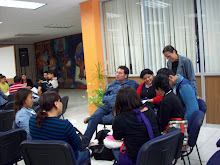

What a difference a couple of years and the levelling effects of the Army can have.
It certainly seems to be true in the case of Prince Harry, with whom I have just spent 48 hours in the southern African kingdom of Lesotho.
Clarence House wanted the British media to see Harry's latest efforts in support of Sentebale, the charity which he co-founded to help disadvantaged children in Lesotho and, particularly, the many thousands who have been orphaned by the country's Aids epidemic.
Deserves credit
The statistics of that epidemic are startling. An estimated one-third of Lesotho's 1.8 million population are HIV-positive.
Forty per cent of Lesotho's children have lost one or both parents to Aids. And, most sobering of all, average life expectancy in Lesotho - which 20 years ago was 52 years - has now fallen to 34.
Plainly Lesotho faces an immense challenge.
Yet its own leaders seem reluctant to recognise the scale of the issue or to commit themselves fully to address it.
Their inertia is due to several factors, not least to a cultural reluctance which is evident across southern Africa to accept that a disease which is predominantly spread by sexual activity is causing such an immense problem.
All of which makes the work being done by Sentebale and the leadership role being played by Harry all the more important.
One of the difficulties of being a BBC correspondent who covers the activities of Britain's Royal Family is that to offer any praise of any member of that particular family will inevitably lead some people to suggest either that it proves the BBC as a whole is just a craven part of the establishment, or that this particular reporter has swallowed too much Palace red carpet.
I do not believe that is the case. I certainly hope not. But, at the same time, I do believe Harry deserves credit for what he and his charity are achieving in Lesotho.
'Mother's humanity'
It would be easy to deride the whole venture as a convenient, half-hearted plaything which gives Harry a good excuse to spend time in the soothing surroundings of southern Africa where, coincidentally, his girlfriend Chelsea Davy happens to hail from.
But on the evidence of what I saw of Harry in Lesotho, there is certainly nothing half-hearted about his commitment to Sentebale.
He plainly cares very much about the plight of children who are the innocent victims of the Aids epidemic.
As Sentebale's director of operations in Lesotho, Harper Brown (an Ulsterman whose background is in the Army and the NHS), told me: "Harry knows his stuff and he is deeply committed to this."
Several years ago Harry said he wanted to carry forward his late mother's interest in the Aids problem in Africa.
Since then he has created a charity which is working at grassroots level to help vulnerable young people. He is fulfilling the ambition he set himself, and in doing so he is demonstrating that he has become a considerable asset to the Royal Family.
He is emerging as a prince who is at ease with himself, and who is comfortable with people.
He has none of the stuffiness of some of the older members of his family and he carries a lighter sense of destiny than his brother.
The result is that he is a natural crowd pleaser who brings his mother's unaffected simplicity and humanity to what he does.
It is a powerful combination. It works and, in the tiny mountain kingdom of Lesotho, it is making a difference.






No comments:
Post a Comment